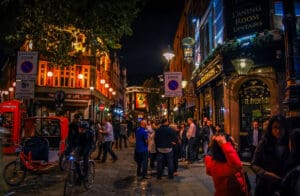
Britain’s nightlife is shrinking at an alarming pace, with large parts of the country turning into cultural “deserts” as pubs, clubs and music venues shut their doors.
Fresh research by the Night Time Industries Association (NTIA) and NIQ shows that more than one in four towns and cities now have no nightclub at all, while 16 per cent have lost all late-night venues.
Since March 2020, Britain has lost over a quarter (26.4 per cent) of its after-hours venues, leaving just 2,424 still open nationwide. Birmingham has seen the sharpest decline, with numbers down 27.5 per cent, while Manchester has recorded a 23.3 per cent fall and now counts just 79 late-night venues. London has suffered a 20.8 per cent reduction.
Michael Kill, chief executive of the NTIA, warned the losses were stripping towns and cities of vital cultural infrastructure:
“Nightclubs and late-night venues are more than just places to dance – they’re cultural institutions, economic engines and cornerstones of community life.”
While Covid lockdowns began the wave of closures, the NTIA said the decline has worsened since the spring budget, when Chancellor Rachel Reeves raised payroll taxes and the minimum wage.
Karl Chessell of NIQ said: “These closures have coincided with soaring operational costs – including increases to minimum wage and National Insurance in April – and a continued shortfall in post-pandemic support for independent operators.”
The research shows three bars, clubs or music venues have closed every week over the past three months alone. Late-night venues are vanishing at nearly twice the rate of restaurants and pubs, which have declined by 14.2 per cent since 2020.
Industry leaders warn that the loss of smaller venues poses a long-term threat to Britain’s creative industries.
Mr Kill said: “Small venues nurture new talent, fuelling the success of globally renowned artists and the creative economy. You don’t get Ed Sheeran, Dua Lipa or Oasis without small venues. The collapse of independent venues puts the entire nighttime economy at risk.”
A recent survey of hospitality businesses found almost three quarters were now closing for part of the week to save costs, while many restaurants, pubs and cafés have cut jobs in response to April’s National Insurance and minimum wage increases.
The Treasury defended its approach, insisting it is easing burdens on smaller operators. A spokesman said: “Pubs, clubs and music venues are the heartbeat of communities, which is why we are backing this sector with proposals to rip up arduous regulations, supporting businesses to serve their customers for longer, and binning the outdated rule that businesses need to pay to advertise in locally printed press if applying for a licence.
“As part of our Plan for Change we are also protecting the smallest businesses from the employer National Insurance rise and reforming the business rates system – this is alongside already cutting alcohol duty on draught pints and capping corporation tax.”
For now, though, the numbers paint a bleak picture. With Britain losing one in four of its nightclubs in just four years, and closures accelerating in its biggest cities, campaigners warn that whole swathes of the country risk being left without any form of nightlife at all.
Read more:
Reeves tax raid blamed as nightlife ‘deserts’ spread across Britain
